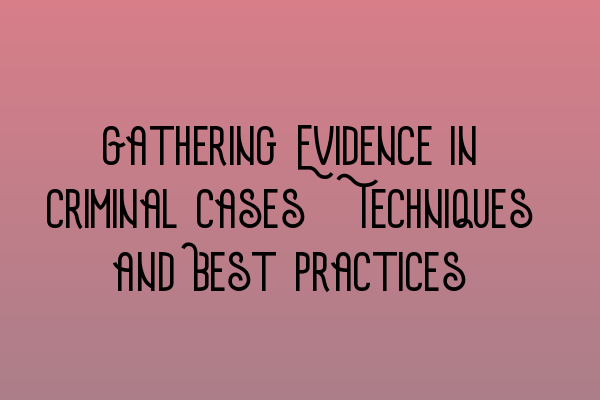Gathering Evidence in Criminal Cases: Techniques and Best Practices
When it comes to criminal cases, gathering evidence is of paramount importance. It is the foundation upon which legal arguments are built and can make or break a case. In this article, we will explore the various techniques and best practices for gathering evidence in criminal cases.
1. Document Gathering
One of the initial steps in gathering evidence is the collection of relevant documents. This could include police reports, witness statements, medical records, financial documents, and any other documents that may be pertinent to the case. By thoroughly reviewing and analyzing these documents, prosecutors and defense attorneys can identify key pieces of evidence that can strengthen their arguments.
When documenting evidence, it is crucial to maintain a clear chain of custody. This ensures that the evidence is admissible in court and cannot be tampered with or questioned. Gathering evidence and maintaining a documented chain of custody demonstrates professionalism and credibility.
2. Witness Interviews
Witnesses play a crucial role in criminal cases, and conducting interviews with them is another essential technique for gathering evidence. These interviews can be conducted by law enforcement officers, private investigators, or legal professionals. Careful questioning and active listening can elicit important details that may strengthen the case.
It is important to note that witness interviews should be conducted ethically and according to legal guidelines. It is crucial to respect the rights of witnesses and ensure that they are not coerced or influenced during the interview process. By conducting interviews in a professional and respectful manner, the gathered evidence becomes more credible and reliable.
3. Forensic Analysis
Forensic analysis involves the examination and interpretation of physical evidence. This can include analyzing DNA samples, fingerprints, ballistics, and other forms of scientific evidence. Forensic experts have specialized knowledge and training to extract valuable information from such evidence.
Integrating forensic analysis into criminal cases can provide strong evidence that is often considered highly reliable in court. By linking physical evidence to the elements of the crime, prosecutors or defense attorneys can establish a strong argument.
4. Surveillance and Electronic Evidence
The advancement of technology has revolutionized the way evidence is gathered in criminal cases. Surveillance footage, phone records, emails, social media posts, and other electronic evidence can serve as valuable pieces of evidence in court.
However, gathering electronic evidence requires specialized knowledge and skills. Working with experts who understand the nuances of extracting and preserving electronic evidence is crucial to the success of a case. Additionally, it is important to ensure that any electronic evidence is legally obtained, as improperly obtained evidence may be inadmissible in court.
5. Collaboration and Expert Testimony
Gathering evidence is not a solo effort. Collaboration between legal professionals, investigators, forensic experts, and other relevant parties is often necessary to gather sufficient evidence.
Furthermore, expert testimony can significantly impact the outcome of a criminal case. Experts with specialized knowledge in a particular field can provide insight and validation to the evidence presented. Their testimony can help clarify complex matters and provide a compelling argument.
Conclusion
Gathering evidence in criminal cases requires a strategic and comprehensive approach. Document gathering, witness interviews, forensic analysis, surveillance, electronic evidence, collaboration, and expert testimony all contribute to building a robust case.
At SQE Criminal Law & Practice Law UK, we understand the importance of evidence in criminal cases. Our experienced team of solicitors and legal professionals are well-versed in the latest techniques and best practices for gathering evidence. Contact us today to learn more about our services and how we can assist you.
Related Articles:
- SQE 1 Practice Exam Questions
- SQE 1 Practice Mocks FLK1 FLK2
- SQE 2 Preparation Courses
- SQE 1 Preparation Courses
- SRA SQE Exam Dates
